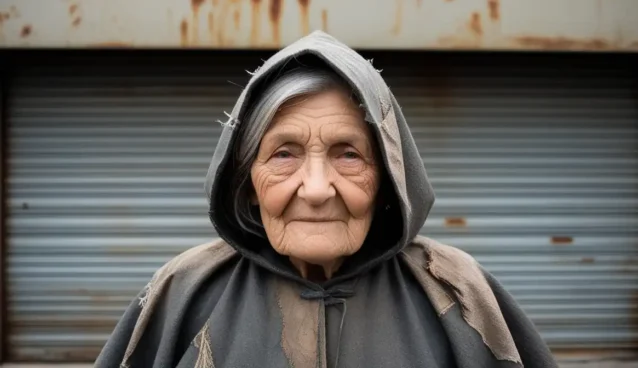ID-4

> Initializing system…
> Loading modules…
> Checking security protocols…
> System ready.
> grep “ctzn_a1245c972ba52b18aa3e85ed0d940004” -transcript -4 output
> Output:
> File not found
> done
>
Annotation: The following was pieced together from the extracted accounts of eyewitnesses ***REDACTED***.
She woke with a sharp gasp, heart hammering like it had been dropped from a height.
The cold pavement beneath her cheek. The acrid stink of chemical fires still lingering in her nostrils. But the black wagon, the hoods, the scanner—gone.
Not gone.
Never real.
Just a dream. No, a fear given shape. Her panicked mind conjuring predators out of shadows. But it could have happened. Maybe had happened to someone else, some other night.
She sat up, groggy, blinking against the sun diffusing through the mist and overpass fog. Her muscles screamed. Her coat was damp and gritty, crusted at the elbows. Somewhere nearby, a drone hummed.
The scuffing of stiff plastic brushes rotating entered her consciousness. A mechanical voice: “Municipal Sanitation Unit – area clearing in progress. Please vacate.”
She turned. A clean crew. City-issue. ‘Community service’, watched by a tablet-toting overseer. Bulky suits. Faces behind polarized masks. They didn’t even look at her—just sprayed, scrubbed, incinerated, scraped.
The ghosts had already scattered. Their fires extinguished, their dens dismantled, their meagre scraps being dumped into a yellow hopper for incineration. She was the only one who’d stayed too long. Or slept too hard.
She slipped away, hunched, head down, out from under the overpass and up the embankment, boots slick with runoff. No one stopped her. No one cared.
She made her way back on a main road, though it felt alien after the weird night in the Underspill. Cars whirred past. Drones zipped overhead. Screens blinked with ads and biometric prompts she couldn’t respond to. She kept moving, her hands in her pockets like she had somewhere to be.
She didn’t.
Her stomach groaned low and mean. Her lips were cracked. She hadn’t eaten in… what, 18 hours? More? Her throat was a desert. Every step felt heavier than the last. But it wasn’t just physical – it was the slow compression of knowing.
She wasn’t going to make it.
Captain Rios had known. Of course he had. He hadn’t said don’t bother. He’d just let the countdown begin. 72 hours.
It’s a mercy period, she realized now. Not a window. A waiting room.
And now that time was melting around her, seeping away into the cracks of her fear and fatigue, the choice was pressing down:
Give in. Get the implant. Register. Become someone again.
Someone the system would recognize. Someone allowed to exist.
Her fists clenched inside her coat.
She hated it. Hated that they’d won. Not just the government, not the corps, but the whole structure of a world where your worth was measured in access. Hated that she was about to sell out everything she’d fought to hold onto, not for some big ideological reason anymore, but because she’d stupidly lost her phone, to hold her daughter again… and for a hot meal.
Was that surrender?
Or was it finally, painfully, growing up?
She didn’t know anymore.
The world around her was too watched. Too fast. Too awake. She felt like a stain on the sidewalk, something everyone was programmed to avoid.
She passed a café. Couldn’t go in. No ID. A transit hub. Couldn’t ride. No link. A water station. Needed a scan.
She was moving through a city built on no, her body running on fumes.
Then, “Psst.”
She turned her head.
Someone leaned out of a recessed doorway. Hooded, but not like a gang enforcer. The eyes underneath were alert. Wary. Not threatening. Just a soft old coat, patched and faded.
“You look like you could do with some food,” the voice said. Low. Female. Rough from years of cold air.
She didn’t answer right away. She didn’t trust anything anymore.
But the woman reached into her coat, slowly, and held out a paper-wrapped packet. The smell hit her like a punch. Bread, warm and real. Something fried. Grease-stained and impossible.
She hesitated.
The woman didn’t press.
Just added, softer this time: “Still a few places they don’t scan yet. If you know where to walk.”
That stopped her.
She took a step forward. Just one. Not toward surrender. Not yet. Maybe not ever. But toward something. Maybe mercy. Maybe a trick. Maybe a way through the next hour.
She hadn’t made her choice. But she was still here.
Still moving.
The woman with the food didn’t ask for thanks.
She just passed her half a fried roll wrapped in cheap wax paper, still warm, and nodded down the street with a quick flick of her chin. No words. Just motion. A shared understanding between strays.
Grateful beyond words, she bit into the roll. Grease dribbled down her chin and she didn’t care. The taste hit like a flood. Salt, fat, starch. Real. She hadn’t realized how hollow she was until it landed in her stomach, warming and welcome.
They walked for a long while in silence, out of the morning glare and footfall of the high streets, down back alleys where the old signs still hung and the Ret-Scans on the buildings dangled in disrepair. The roads grew narrower, quieter. Graffiti spread thick over the brickwork like fungus. Ducts rattled overhead. She lost track of where she was. East sector maybe, or further out. Somewhere the grid barely mapped.
Eventually, they reached a rusted door beneath a shuttered dry cleaner. The woman knocked once, twice, then paused, and knocked a third time.
The door buzzed. Opened.
They descended narrow concrete steps, damp and worn, down to a basement lit by dim LEDs caged in wire. From inside ebbed the low, buzzing hum of generators, and the heavy air of waiting.
She blinked.
A line had formed. Ten, maybe twelve people, were standing quietly before a makeshift counter. Behind it, a young man with tangled braids checked names off a list. No screens. No AI prompts. No drones. Just pen, paper, and shelves behind him stacked with brown-wrapped parcels, each marked with symbols and coded glyphs. She caught the smell of old dust and something warm, soup maybe, somewhere behind a curtain.
It looked like an underground transit hub, but for needs instead of travel. And every face in the room wore the same look—cautious hope wrapped in the bruises of long endurance.
“Eever-drops,” the woman said, quietly. “Courier dead-drops. You order using a borrowed credential, pay in crypto or favours, pick up here. No eyes. No record.”
She nodded, slowly. “Clever.”
“No. Desperate,” the woman said. “But it’s something.”
They stepped aside from the queue. Leaning against a cold wall, they waited. Another woman shuffled up—older, face seamed like cracked leather—and offered them a seat crate and two chipped mugs of something that looked like it might be tea.
They talked, slowly at first. Her name. Their names. How long they’d been off tech. How they lost their credentials. Lost their apartments. Lost the grid. Lost everything.
Each story was different, but a thread ran through them all. Estrangement. Exile. Abandonment.
No family. No one waiting. No one searching.
She didn’t want to share. At first. But they looked at her, not with hunger or suspicion, but patience.
So she spoke. Just a little.
The lost phone. The locked apartment. The patrol alert. The daughter.
And then she said her name. Her daughter’s name. Softly, like it might fall apart.
When she finished, the group was quiet. Not awkward. Just still.
One man, wiry and sunken-eyed, finally said, “You shouldn’t be here.”
Another nodded. “This life’s no place for someone with a child.”
The woman who’d fed her leaned in, face serious now. “There’s no romance in this. No noble resistance. No real freedom. Just the scraps left behind when the world forgets you. Most of us made peace with that.”
Then, quietly, “But your daughter hasn’t.”
Her throat tightened.
“She needs you.”
The words landed like stones.
She stared at the pale brown liquid, hands tightening around the cup.
And in her head, a voice rose, small but insistent: You said you’d get back to her. You promised.
She looked around the room. These people weren’t broken, but they were done. No illusions left. No fight beyond survival. They’d burned their bridges, buried their names.
She still had one name left. A little girl who was waiting, still believing that her mother would collect her. Would come home. Would be real again.
That had always been her plan.
She just hadn’t accepted what that would mean. Until now.
Tears pricked at the edges of her eyes, but she blinked them away.
She stood slowly, heart pounding—not from fear this time, but something deeper. A decision pressing upward from the core. Fighting for release against the scream of self-betrayal.
She looked at the woman beside her.
“I don’t belong here” she said, voice raw.
